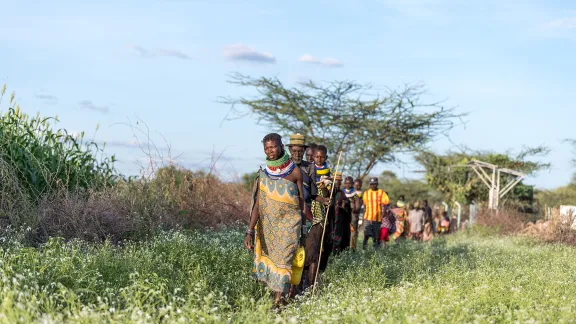LWF and partners call for more sustained assistance to the Horn of Africa. The humanitarian response must be fully funded to mitigate the effects of climate injustice in the re and urge donors to address the impact of climate change and climate injustice in the region.

A group of Turkana – a pastoralist community near Kakuma refugee camp, Kenya – walk home from an LWF-supported farm in Nakoyo. The community is learning how to grow diverse crops as a changing climate and extended dry seasons has made their traditional livelihoods of keeping livestock increasingly difficult. Photo: LWF/Albin Hillert
“Address the impact of climate injustice”
(LWI) - Fully fund the humanitarian response to the drought in the Horn of Africa. The Lutheran World Federation (LWF) has joined an interagency call to international governments to fully fund the emergency response at the Horn of Africa. The call of the Inter-Agency Working Group (IAWG) comes at the beginning of the Horn of Africa High Level Pledging Conference in New York on 24 May 2023.
“We urge global donors to address the impact of the climate injustice taking place in the region by making the financial pledges required to fully fund the humanitarian response and help address immediate and long-term needs across Ethiopia, Kenya and Somalia, where millions of people are trapped in a devastating cycle of hunger and displacement,” the call reads. It has been signed by 21 agencies, including LWF and many of its long-standing partners.
43,000 have died, more than 35 million need of assistance
The region is suffering from the effects of climate change, most notably droughts and floods. As many people depend on rain for subsistence farming and livestock keeping, droughts cause hunger and displacement in the entire region. Currently, the three countries are dealing with the worst drought in the region’s recorded history.
“The drought, in convergence with other shocks such as unusually high food and commodity prices and ongoing conflicts, has destroyed lives and livelihoods and driven record levels of humanitarian needs,” the agencies state in the call.
The agencies add that “In 2022 alone, a recent UN report suggests that an estimated 43,000 people died as a result of the drought in Somalia, half of them most likely children under the age of five, and 5 million people were internally displaced in Kenya, Ethiopia, and Somalia, including 2.3 million by disasters and 2.7 million by conflicts and violence. Over 35 million people require urgent assistance across the three countries (…). An estimated 23.8 million people currently face hunger in the region.”
The drought, in convergence with other shocks such as unusually high food and commodity prices and ongoing conflicts, has destroyed lives and livelihoods and driven record levels of humanitarian needs.
– IAWG- statement
Accept responsibility, scale up response
The signing agencies urge the international community gathered in New York to commit to “coordinated, long-term" funding to respond to the current emergency while building resilience and help communities adapt to climate change.


